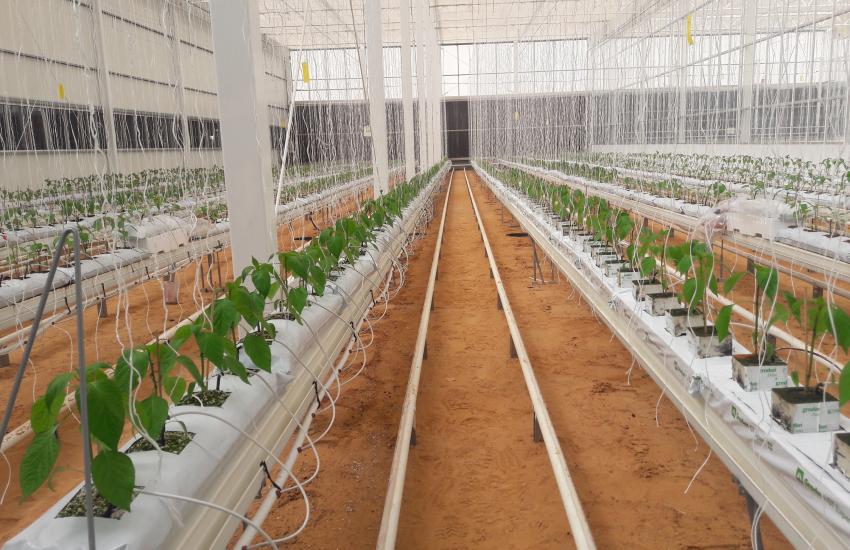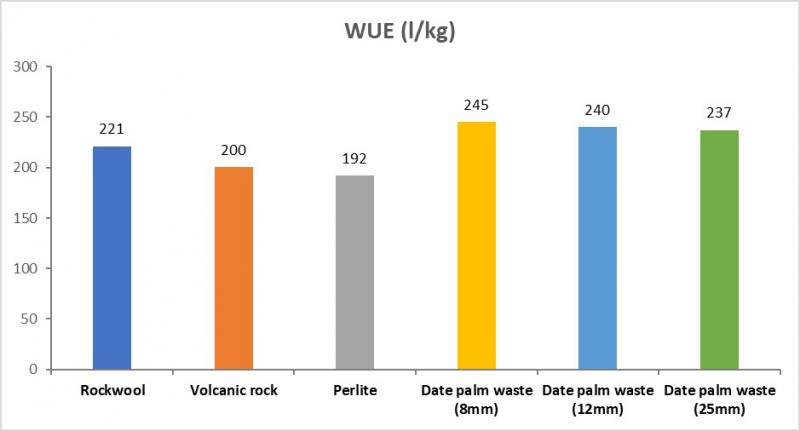
Soilless culture is considered an important and valuable technique to grow vegetable crops in the Kingdom of Saudi Arabia in order to reduce the risk of root-borne diseases and have the possibility of saving water and nutrients. Furthermore, cost of substrate, renewable or disposable after use, is another limited factor in substrate selection. Therefore, volcanic rock and date palm waste are highly available and cost-effectives materials in Saudi Arabia. Hence, soilless culture is adopted at Estidamah to test characteristics of different growing substrates, including water holding capacity to optimize yield of sweet pepper grown in Med-Tech glasshouse.
Experiment:
- Sowing on the 13th January 2019.
- First harvest: 17th of April 2019.
- Last harvest: 16th of September 2019.
- Harvesting period: 153 days.
- Sweet Pepper Variety: Clavesol RZ.
- Testing the potential of Rock wool and Date palm waste as local Saudi resources and their suitability to be used as growing media in soilless culture under Saudi conditions.
- Studying the effect of different growing media on fruit yield of sweet pepper.
Below Six soilless substrates were tested and all the substrate materials were placed in 16 L plastic slabs.
- Rockwool
- Volcanic rock
- Perlite
- Date Palm Waste fraction 1 (8 mm)
- Date palm waste fraction 2 (12 mm)
- Date palm waste fraction 3 (25 mm)
-
Sweet pepper yield was improved by 12% with volcanic rock growing media and by 5.9% with perlite as compared with Rockwool (control).
-
The yield of sweet pepper plants grown in date palm waste formed between 88.2 to 90.7% of Rockwool yield (control).
-
The lowest water consumption was recorded when using perlite (8.2%) as compared with Rockwool (control).
-
Perlite and volcanic rock improved water use efficiency by 15.3% and 10.4%, respectively, compared to Rockwool (control).
-
Water use efficiency of date palm waste ranged between 6.7 to 9.7% less than Rockwool.
Physical and Chemical Properties of the Different Soilless Growing Media.
| Physical Properties | ||||
|---|---|---|---|---|
| Items | Date Palm Waste | Volcanic Rock | Rockwool | Perlite |
| Water Holding Capacity (%) | 70 | 60 | 98 | 80 |
| Bulk Density (g/cm3) | 0.25 | 1.06 | 0.04 | 0.21 |
| Organic Matter (%) | 22.2 | 0 | 0 | 0 |
| EC (ds/m) | 4.6 | 0.013 | 0.015 | 0.12 |
| CEC (Coml/kg) | 37.5 | 9.5 | 0 | 0 |
| pH | 6.7 | 7.5 | 7.6 | 7.2 |
| Weight of (16 L) slab in kg | 3 | 12.3 | 0.7 | 3.4 |
| Chemical Properties | ||||
|---|---|---|---|---|
| Items | Date Palm Waste | Volcanic Rock | Rockwool | Perlite |
| N (%) | 21.9 | 13.2 | 9.1 | 8.5 |
| P (%) | 18.9 | 101.9 | 80.8 | 131 |
| K (Cmol/kg) | 16.4 | 0.8 | 3.7 | 0.8 |
| Mg (Cmol/kg) | 12.9 | 2 | 4.4 | 7 |
| Ca (Cmol/kg) | 26.1 | 4 | 5 | 3 |
| Na (Cmol/kg) | 3.53 | 8.4 | 3.1 | 5 |
| Fe (mg/L) | 2.9 | 72.7 | 14.1 | 440.9 |
| Mn (mg/L) | 0.3 | 5.6 | 0.3 | 48.6 |
| Zn (mg/L) | 0.88 | 0.89 | 0.33 | 4.28 |
| Cu (mg/L) | 0.22 | 0.07 | 0.1 | 3.44 |
Sweet Pepper Marketable Yield and Yield Component were Grown in Different Soilless Growing Media in Med-Tech Greenhouse, 2019.
| Substrate | Fruit Yield (Kg/m2) | Avg. Fruit/m2 (numbers) |
Avg. Fruit Weight (gm) |
Avg. Fruit Length (mm) |
Avg. Fruit Diameter (mm) |
Avg. Fruit Pulp Thickness (mm) |
|---|---|---|---|---|---|---|
| Rockwool | 11.9 bc | 74 ab | 160.5 a | 87.8 a | 79.6 a | 8.5 a |
| Volcanic Rock | 13.3 a | 79 a | 168.5 a | 91.4 a | 75.4 ab | 8.1 a |
| Perlite | 12.6 ab | 78 a | 160.8 a | 91.7 a | 71.5 b | 7.4 a |
| Date Palm Waste (8mm) | 10.8 cd | 68 bc | 160.8 a | 91.0 a | 75.8 ab | 8.2 a |
| Date Palm Waste (12mm) | 10.5 d | 66 c | 167.3 a | 89.0 a | 72.1 b | 7.4 a |
| Date Palm Waste (25mm) | 10.6 d | 68 bc | 156.1 a | 87.3 a | 75.9 ab | 8.6 a |
Data within columns having different letters are significantly different at p less than 0.05
Water Use Efficiency (L/kg fruit) for Sweet Pepper Grown in Different Growing Media in Med-Tech. Greenhouse. Estidamah, 2019.

Conclusions
- Volcanic rock and date palm waste could be used as growing media in soilless culture in Saudi Arabia instead of imported Rockwool because these materials are locally available and cheaper in price.
- Although volcanic rock is a heavy material, it can be used for several years in contrast to perlite (light material) which can be used for one growing season only.
- Date palm waste can be used for one growing season, without any negative impact on the environment.